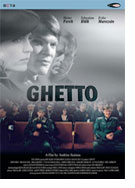

Opening 8 Jun 2006
Directed by:
Audrius Juzenas
Writing credits:
Audrius Juzenas, Joshua Sobol
Principal actors:
Heino Ferch, Sebastian Hülk, Erika Morozsán
Lithuanian director Audrius Juzenas’s film Ghetto is an adaptation from the award-winning play from Israeli Joshua Sobol of the same name – Ghetto. The story begins with the occupation of the Nazis in the city of Vilna, Lithuania in July 1941. There were about 55,000 Jews who lived in and around the city of Vilna, and according to the Nazi’s purification crusade, they needed to be annihilated. The job of liquidating the city was put in the hands of twenty-two year old Nazi commander Kittel (Sebastian Hülk).Young and inexperienced Kittel was aware of the pressure his job demanded but moved quickly to gain the praise from his supervisors. However, he didn’t have enough German soldiers to assist him in fulfilling his job, so he reverted to using Jewish controllers and slowly pursued his goal. The use of Jewish controllers to assist in keeping the peace among the Jewish folk was common. In spite of the fact that this was not a volunteer position for a Jew, it naturally had some advantages, especially in regard to protection.
In the heart of Vilna’s Jewish ghetto between 1942 and 1943, there were close to 15,000 Jews and many were well-known in the arts and entertainment scene. Knowing that Commander Kittel had a soft spot for excellent musical talent, Jewish controller Gens (Heino Ferch) made it known to Kittel that his ghetto could make a name for himself if he choose to further the Nazi “humanitarian” propaganda to the world. Kittel agreed! Through his deep love for theater and music, he allowed himself to be emotionally smitten with the talented Jewish troop he had raised. However, his obsession was for a beautiful Jewish opera singer, Haya (Erika Morozsán). Kittel successfully held a tight reign on the façade of happy-times which was promoted by his ghetto. With the assistance of Gens, Kittel held his reign, which allowed Gens the possibility to secretly transport many of his folk to safety, but not without participating in Kittel’s continual brutal slaughter. Kittels’ happy-times façade held for one year until the Russians began to close in on the Nazi foothold in Lithuania. Kittel’s good- times came to an end that left an aftermath of confusion, emotional trauma and lasting visual impressions. No more comments! (Karen Pecota)